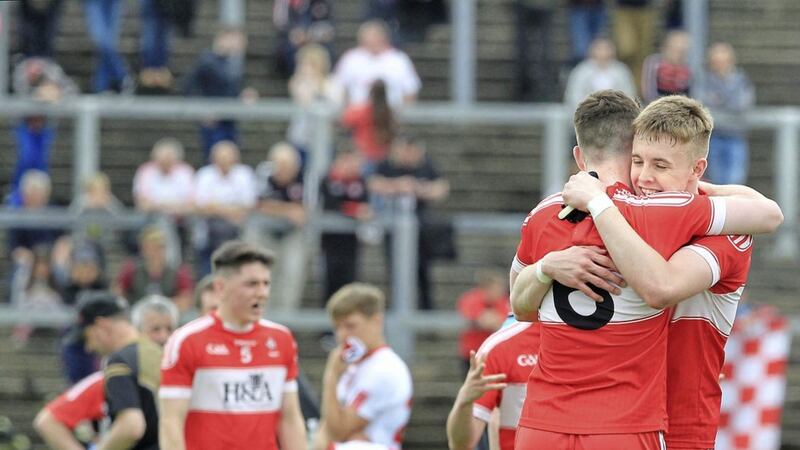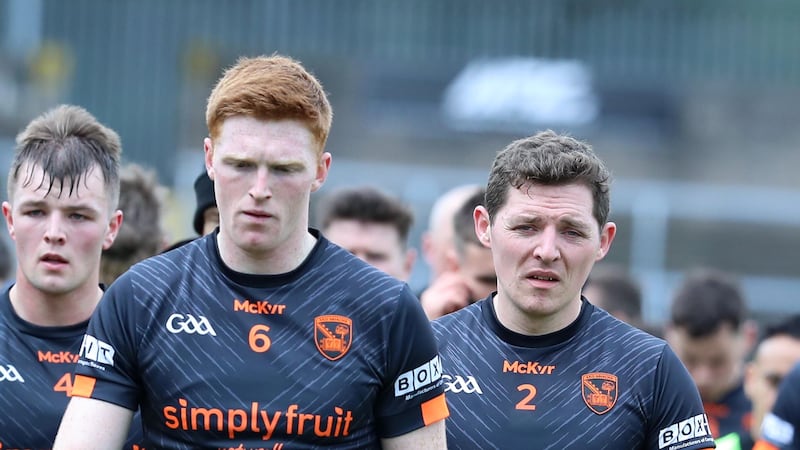IT’S 41 miles from my home in Bellaghy to the entrance of Celtic Park on the Lonemoor Road in Derry city.
Driving there on Sunday from one end of the county to the other, there wasn’t a chink of light for the soul.
At the car wash just opposite my father’s home house on the main road stood the sole chequered red and white flag that Derry fans would have encountered on the journey.
Half 5 on a clammy summer’s eve and the flag stands limp and dishevelled on its post, a loner bowed though it was left with a dreadful hangover from the afternoon’s events.
None of it came as any great surprise beyond the fact that Tyrone were actually so poor for most of the first 48 minutes that they contrived to give Derry hope.
Within three points and with Mark Lynch now on the edge of the square, little bubbles of noise began to float through the previously dead air.
Then the visitors found the clutch and dropped down a gear, taking off up the hill towards the Brandywell End and leaving another summer in early ruins.
Next year will mark two full decades since the Anglo Celt last visited the schools and parishes of Derry.
It’s hard to be critical of the players that turned out on Sunday. It’s near impossible in this day and age to be critical of lads that give up four and five nights a week to better themselves in a bid to do their county proud.
Even more so because it has never looked easier to give up. So many men that could have turned out for Derry this year weren’t available for any number of reasons.
And when you consider that the Championship draw was made back in October and that those players that hung in there would have been well aware they’d lost five times to Tyrone in Damian Barton’s first year, that the margin last May was 11 points and that the squad was now severely weakened, then criticism becomes even tougher.
There was a huge turnover of players in winter but that has become an annual problem. In the six years and 19 Championship games since the 2011 Ulster final defeat by Donegal, Derry have given an outing to 55 different players.
That’s the equivalent of two-thirds of a team changing every single year since - and all but three of those 55 are still playing with their clubs.
Three years ago under Brian McIver they reached a National League final and pushed Donegal all the way in Celtic Park.
Only Chrissy McKaigue, Ciaran McFaul, Enda Lynn and Emmett McGuckin started at the weekend from that team.
You lose the best man-marker in Ulster in Dermot McBride, you’ll struggle. Without the bit of an edge that Gareth McKinless gives you, you’ll struggle.
Sean Leo McGoldrick’s savvy in possession, Kevin Johnston’s athleticism, Eoin Bradley’s mercurialism, Cailean O’Boyle’s goalscoring eye – any team would do well to replace those lost items.
By contrast Tyrone have played ten more games in the same period since 2011 and have gone through an entire transition that can be boxed as pre- and post-Armagh 2014, yet have given games to just 46 different players.
Yet for the Derry supporters – whose numbers were small – in Celtic Park there was one real glimmer of hope for Derry through the blackness of Sunday.
The minors were again superb and are now an hour from a third consecutive Ulster final – something that even in the halcyon days for St Pat’s Maghera, Derry has never achieved.
Damian McErlain’s teams of the last three years have had such a brilliantly defined shape about them. They play attacking football with an understanding that they must be hard to break down. They use the boot on the counter-attack. Decision-making is worked on over and over and over again at Owenbeg.
With the possible exception of an All-Ireland semi-final against Kerry two years ago, you could watch Derry minors play each week and recognise that there is a consistency in their performance and style that comes from the training ground.
That was one of the key elements lacking in the senior effort two hours later.
There has to be criticism levelled at that. For 14 of the 20 months that Damian Barton has been in charge, Derry have known their first Championship game would be against Tyrone.
Very little about Tyrone’s system has changed from last year to this. They weren’t very good on the day.
Central figures Mattie Donnelly, Peter Harte and Niall Sludden were relatively quiet by their standards. And yet they still went out the gate with an 11-point win.
Barring a couple of individual solos from Enda Lynn, it’s hard to remember a single instance in the game where Derry picked a gap inside Tyrone’s 45 and ran hard through it.
Yet Danny Tallon would have been as well standing beside that flag on the Foreglen Road because they never kicked him a ball. It was the loneliest of furrows he ploughed, running around inside all day for nothing.
Derry football is not in a great place. They will start next year in Division Three, and the National League is the most honest of barometers. It is incapable of mistruth.
The club scene is competitive, yes, but devoid of the quality or depth that it once had. And ironically because of that, players see success with the club as an even more realistic ambition than ever before.
The county jersey has grown less and less attractive. To lads like Niall Keenan, who was absolutely magnificent on his debut on Sunday and will go on to star for many years, it means everything. From generation to generation, grandfather to grandson, he was born and lives for this.
But for dozens upon dozens of lads it has been too much of a whim to play for Derry. The county has to find a way to shut the revolving door.
With three fine consecutive minor teams on the trot making their way through to senior football, it’s absolutely imperative that Derry’s next manager implements a steadfast, recognisable gameplan fitted to the modern game.
Something radical is needed to convince the next generation that success at senior level with Derry is possible.
Anything else and that lonely flag will still have its head drooped in ten years’ time, wondering what happened the lads off those three good minor teams.








